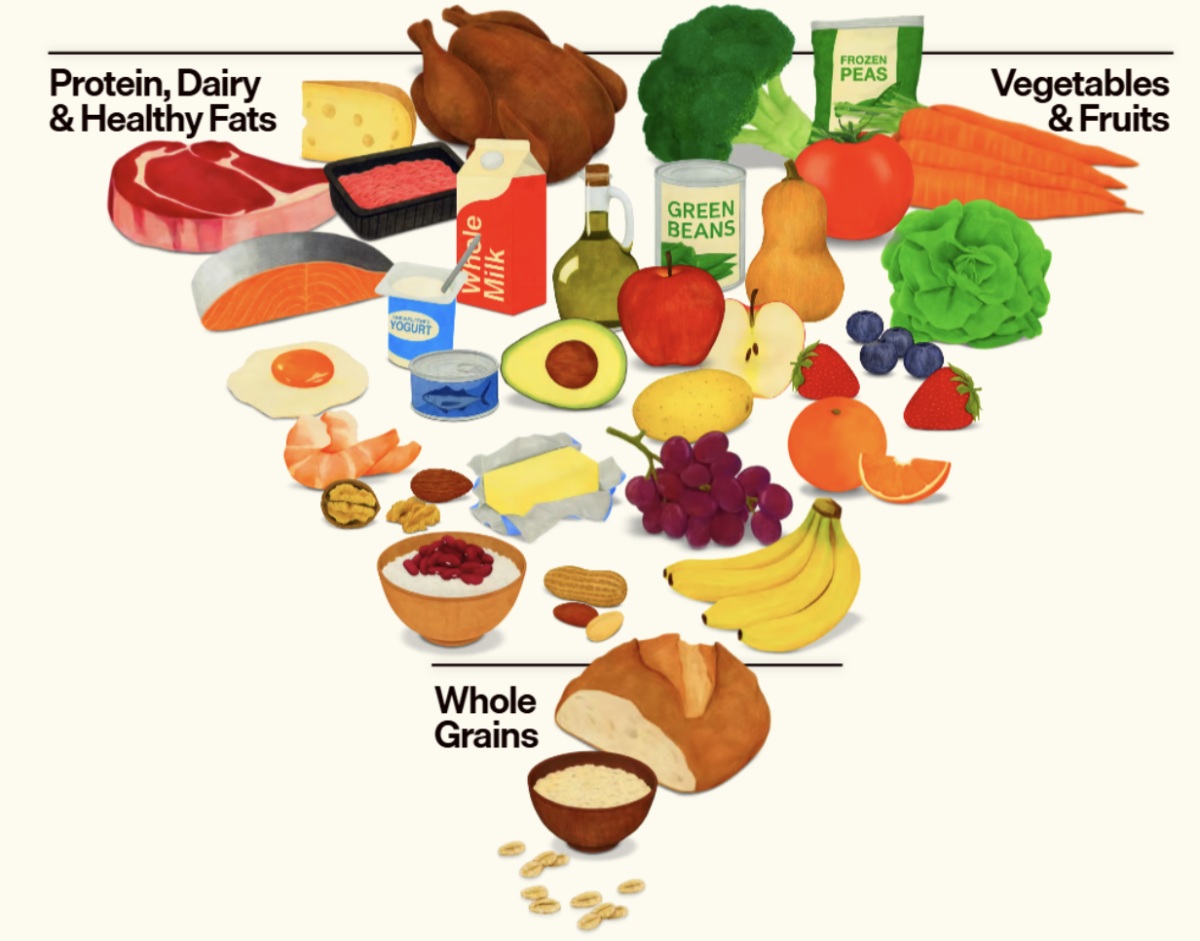New Dietary Guidelines
On Jan. 7, 2026, HHS and USDA released the 2025–2030 Dietary Guidelines for Americans (DGA, or “Guidelines”), this is the 10th edition guidelines. The Guidelines set the framework for federal nutrition programs, food standards, and nutrition education. It is usually updated every 5 years by a team of experts, public meetings that can live-streamed, public commented. This year the scientific report was generally dismissed. It’s unclear as to who was involved in finalizing these 2026 guidelines.
While the new Guidelines keep some science-based recommendations from previous versions, they also deviate sharply from both the 2020–2025 Guidelines and the independent scientific report issued by the 2025 Dietary Guidelines Advisory Committee (DGAC). USDA and HHS rejected more than half of the DGAC’s recommendations and relied on a new Scientific Foundation report instead of the DGAC’s transparent, science-driven process.

- Previous Guidelines
Previously, the United States promoted healthy eating patterns using the MyPlate model, which was available on myplate.gov. This resource provided visual guidance by estimating appropriate portions for each food group, making it easier for individuals to understand how to balance their meals. MyPlate was introduced to simplify the process of planning nutritious meals and to address the confusion associated with the earlier food pyramid diagram.
Before the introduction of MyPlate, the food pyramid was used as the primary visual guide for dietary recommendations. However, many people found the pyramid format confusing, as it was not always clear how to translate the diagram into daily food choices or appropriate serving sizes. The shift to MyPlate aimed to provide clearer and more actionable guidance for the public by focusing on portions and food group distribution in a familiar plate setting.

- Introduction of the Inverted Pyramid
Unlike previous versions of the food pyramid, the current version is inverted and appears muddled with images of various foods, creating confusion about how food groups are organized. The grouping of foods is unclear, making it more difficult for individuals to understand the recommended distribution among various food groups.
- Placement of Whole Grains
One notable and puzzling change is the placement of whole grains at the very bottom, at the narrow tip of the pyramid. This positioning suggests whole grains as a small part of the diet, as whole grains are traditionally considered a foundational food group of a healthy diet.
- Meat Emphasis at the Top
The current pyramid prominently features meat, indicating a shift in dietary priorities. This stands in contrast to the MyPlate model, which was introduced in 2011 to replace the old pyramid and provide a more balanced and straightforward representation of healthy eating.
- Less Focus on Plant-Based Proteins
The latest guidelines put less spotlight on plant-based proteins like beans and nuts. These foods can fit into any healthy eating plan—whether they’re the main source of protein or just part of the mix. Adding more plant-based proteins usually means less total fat, extra fiber, and more nutrients overall. For a well-rounded diet, it’s smart to keep legumes and nuts in the rotation.
- Dairy and Fats
The updated dietary guidelines talk about dairy, but appear to have a preference for full-fat over heart healthy nonfat, low-fat options. There’s also a focus on using butter and beef tallow for cooking, which adds more saturated fat to meals—a type of fat that’s generally known to be less heart friendly. What’s missing is any mention of healthier fats, like olive oil or oils from nuts and seeds. While the guidelines still say to keep saturated fat under 10% of daily calories, it’s hard to see how that’s doable when the recommended foods are heavy in saturated fat. By putting more emphasis on meats and full-fat dairy, the guidelines make it even tougher for people to limit saturated fat.
- Science-Based Highlights from the Guidelines
While the new dietary guidelines might cause confusion and debate, there are still solid, science-backed recommendations to keep in mind. They encourage a focus on unprocessed, whole foods as the foundation for healthy eating. Cutting back on sugar is also emphasized. Staying hydrated is spotlighted. Red meat and full-fat dairy can be part of a nutritious diet, but it’s important to combine them with fruits, vegetables, and whole grains. This mix supports a more varied and nutrient-rich eating pattern, promoting overall health. Even if some parts of the guidelines seem unclear, it’s possible to stick with the well-supported recommendations and use what’s proven to benefit health.
FITNESS/NUTRITION in the NEWS
Updated Guidelines for Alcoholic Beverages
The latest dietary guidelines now simply advise people to “consume less” alcohol, but don’t spell out exactly what that means. In the past, moderation was defined as one drink a day for women and two for men—standards that were always up for debate, but at least gave some direction. Those numbers are no longer part of the recommendations.
This change does not line-up with guidance from organizations like the World Health Organization, which stated in 2022 that no amount of alcohol is considered safe due to increased cancer risk. Without a clear definition, these new guidelines makes it difficult for those who consume alcohol to know how to moderate intake.
Sheri is a Certified
Nutritionist
with a master's degree in nutrition, with over 15 years of clinical counseling
experience, an ACE-certified Personal
Trainer with advanced certifications in medical exercise, senior fitness and health coaching. All nutrition consultations include exercise guidance, dietary
analysis and meal plans to meet your individual lifestyle, calorie and nutritional needs.
Free introductory 15-minute appointments are also
available.
To schedule an appointment with Sheri Mar, email:
info@EatWellBeFit.com or call or text: 206.789.6440
Do you have a nutrition topic for the month?
Email your suggestions to info@eatwellbefit.com
|